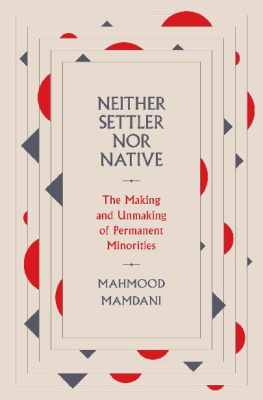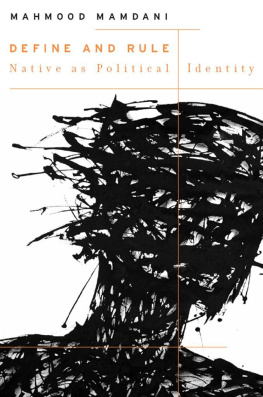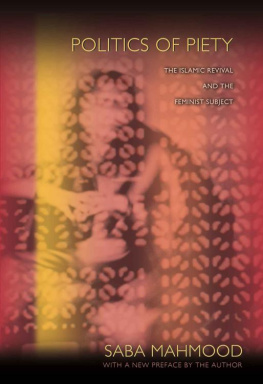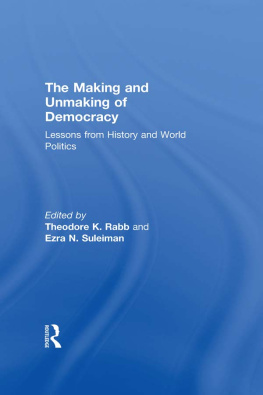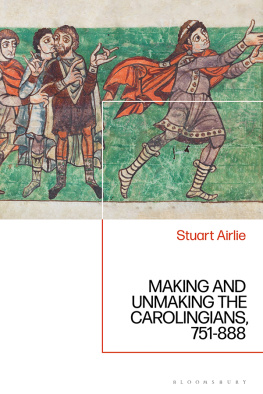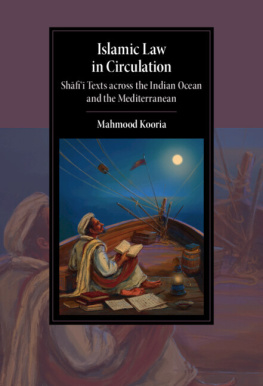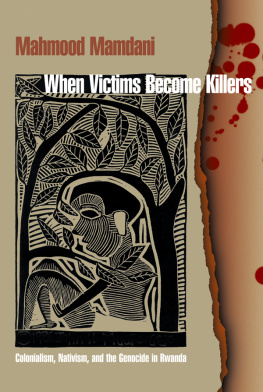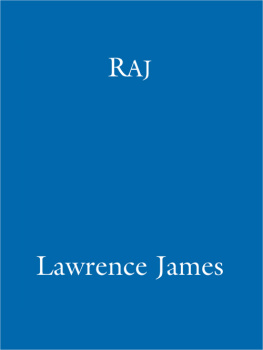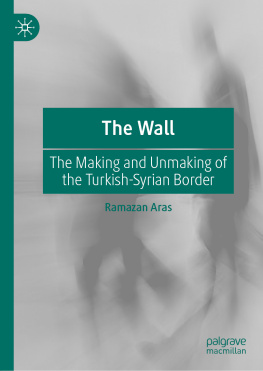NEITHER SETTLER NOR NATIVE
The Making and Unmaking of Permanent Minorities
MAHMOOD MAMDANI
The Belknap Press of Harvard University Press
Cambridge, Massachusetts
London, England
2020
Copyright 2020 Mahmood Mamdani
All rights reserved
Cover design: Sam Potts
978-0-674-98732-6 (cloth)
978-0-674-25272-1 (Indian edition)
978-0-674-24997-4 (EPUB)
978-0-674-24998-1 (MOBI)
978-0-674-24999-8 (PDF)
THE LIBRARY OF CONGRESS HAS CATALOGED THE PRINTED EDITION AS FOLLOWS:
Names: Mamdani, Mahmood, 1946 author.
Title: Neither settler nor native : the making and unmaking of permanent minorities / Mahmood Mamdani.
Description: Cambridge, Massachusetts : The Belknap Press of Harvard University Press, 2020. | Includes bibliographical references and index.
Identifiers: LCCN 2020013624
Subjects: LCSH: Nation-state. | Colonies. | Minorities.
Classification: LCC JC311 .M318 2020 | DDC 320.1dc23
LC record available at https://lccn.loc.gov/2020013624
For Zohran,
You teach us how to engage the world in difficult times. May you inspire many and blaze a trail!
Its like a path across the landits not there to begin with, but when lots of people go the same way, it comes into being.
LU HSUN, Hometown
CONTENTS
The standard biography of the modern state begins with the signing of the Treaty of Westphalia in 1648. That accord largely brought to an end decades of warfare across Europe, in particular the Thirty-Years War that decimated the Holy Roman Empire. At Westphalia, two key components of the modern state were born: religious toleration at home and the reciprocal guarantee of sovereignty abroad. Catholics, Lutherans, and Calvinists were each given official sanction within the empire, and across much of Europe states agreed to respect one anothers legitimacy and authority in their domestic affairs.
This European story tells a moral lesson. In this story, the modern state is associated with tolerance. It is both a product and a guarantor of toleranceamong states and within them. At this triumphant moment, the state imposed a secular peace on the warring factions of society; whatever differences persisted among individuals and groups were subordinated by the law in the interest of peaceful coexistence. But this story starts too late, and, as a result, provides the wrong lesson.
This book traces the founding moment of the modern state instead to 1492. That year marked the beginning of the nation-state, the endurance of which was later secured by Westphalian tolerance. The nation-state was born of two developments in Iberia. One was ethnic cleansing, whereby the Castilian monarchy sought to create a homogeneous national homeland for Christian Spaniards by ejecting and converting those among them who were strangers to the nationMoors and Jews. The other development was the taking of overseas colonies in the Americas by the same Castilian monarchy that spearheaded ethnic cleansing. In this story, modern colonialism was not something that states started doing in the eighteenth century. Modern colonialism and the modern state were born together with the creation of the nation-state. Nationalism did not precede colonialism. Nor was colonialism the highest or the final stage in the making of a nation. The two were co-constituted.
The birth of the modern state amid ethnic cleansing and overseas domination teaches us a different lesson about what political modernity is: less an engine of tolerance than of conquest. Tolerance had to be imposed on the nation-state long after its birth in order to stanch the bloodshed it was causing. In Europe tolerance emerged after Westphalia as the key to securing civil peace within the nation-state. Minorities at home were tolerated in exchange for their political loyalty, which, in practice, meant they were tolerated to the extent that they were seen by the national majority as non-threatening. This regime of tolerance solidified the structure of the nation-state by defining the relation between the national majority and minority. It is this structure of tolerance that is seen as defining the liberal character of political modernity.
But that is political modernity in Europe. In the colonies overseas, and in the settler colonies where there is no clear spatial divide between nation and nonnation, political modernity and its liberalism meant something else. It meant conquest. As a Eurocentric ideology and political discourse, modernity did not require tolerance abroad. Only people deemed civilized had to be tolerated. Othersmarked by their cultural differences from Christian Europeanshad to be made civilized before earning the right to be tolerated. The light of civilization could shine wherever populations conformed to Eurocentric ideals. Thus did Europeans turn to the colonies and seek to build there the avatar of modernity: the nation-state, as it existed in Europe. The French called this the mission civilisatrice, which was anglicized as the civilizing mission.
Had the civilizing mission succeeded, colonial political modernity might have looked a great deal like its European counterpart, with European-style nation-states the world over practicing Christianity and Westphalian tolerance. But the civilizing mission failed, resulting in a colonial modernity that veered sharply from the course taken by European modernity. While liberal tolerance took hold in the European nation-state, liberal conquest inflamed the colonies. By the mid-nineteenth century, the colonizers forcible imposition of its laws, customs, educational practices, language, and community life provoked fierce resistance among the nativesthe word that was used to describe those deemed uncivilized. In response, the British put aside the torch of civilization in order to maintain order.
As I introduce below and explain in detail in later chapters, the new colonial method involved drafting native allies and claiming to protect their ways of life. In the colonies, there would be no native majority built to resemble the colonizer; instead there would be assorted minorities, each preserved under the leadership of a native elite. The native elites power was said to derive from custom, but it was the backing of the colonizer that was their true source of authority. Separated into so many distinct races and tribes, the natives would look to their own rather than to each other in a solidarity that could challenge the colonizer. Although the British were adept in this method, they did not invent it. The Americans did, in the context of controlling the people Columbus had called Indians.
Historians of colonization refer to the civilizing mission as direct rule and the methods that succeeded it as indirect rule. Part of my focus in the coming pages is on a surprising outcome of this shift from one system of rule to another: the emergence in the postcolonial situation of a violent nationalism following from the creation of minorities under indirect rule. The minorities the colonizer created in the colonies sought, after independence, to become the nation. Postcolonial nationalists struggled to consolidate power by transforming society into the home of the nation as they imagined it. The result was an era of blood and terror, ethnic cleansing and civil wars, and, sometimes, genocide. These are the wages of postcolonial modernity, in which political modernity is instantiated by people whose ancestors rejected it.



